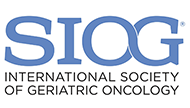
Industry Symposium
Friday, 18 October, 1:00 – 2:00 PM, International I
Prehabilitation – preparation for cancer medical treatment and surgery with a special focus on nutrition support.
A collaboration of SIOG and ESPEN

|
Chairs |
Isacco Montroni / Desiree Steimer |
|---|---|
| Tackling Sarcopenia and malnutrition in older patients: A clinical roadmap |
Desiree Steimer 10 min |
| The role of geriatric assessment: Tailoring nutritional prehabilitation and neoadjuvent treatment |
Chelsia Gillis 10 min |
| Designing a Prehabilitation program: providing a clear guideline on implementation |
Nicole Saur 10 min |
| Optimizing patient’s outcomes: Timing of parenteral nutrition across the cancer care continuum |
Isacco Montroni 10 min |
| Revolutionizing/transforming preoperative care with a multimodal prehabilitation approach: Insights into new nutrition strategies for cancer surgery |
Arved Weiman 10 min |
This session presents a comprehensive clinical roadmap for addressing the critical issues of sarcopenia and malnutrition in older cancer patients, focusing on the intersection of geriatric assessment, nutritional prehabilitation, and innovative preoperative care strategies.
Sarcopenia, the age-related loss of muscle mass and function, couples with malnutrition, significantly compromises the health and treatment outcomes of older patients, particularly those undergoing cancer therapy. Given the growing population of older adults with cancer, there is an urgent need for tailored interventions that address these conditions to improve patient resilience and treatment efficacy.
A central component of this roadmap is the role of geriatric and nutrition assessment combined. By integrating these assessments into the clinical workflow, healthcare providers can tailor nutritional prehabilitation and neoadjuvant treatment plans to meet the unique needs of each patient. Nutritional prehabilitation, which involves optimizing a patient’s nutritional status before surgery or cancer treatment, has emerged as a crucial strategy in enhancing patient outcomes. When combined with a detailed geriatric assessment, this approach ensures that interventions are both effective and aligned with the patient’s overall health profile.
The design of a prehabilitation program is another critical element discussed in this roadmap. Clear guidelines will be provided for the implementation of such programs, emphasizing the importance of a multidisciplinary approach. A successful prehabilitation program should involve a team of healthcare professionals, including dietitians, physiotherapists, and geriatricians, who work together to address the complex needs of older patients. The program should be adaptable, allowing for adjustments based on ongoing assessments and patient progress. Key components include resistance training to combat sarcopenia, dietary modifications to address malnutrition, and psychological support to improve patient adherence and outcomes.
One of the innovative aspects of this roadmap is the strategic timing of parenteral nutrition across the cancer care continuum. Parenteral nutrition can be a critical intervention for patients who cannot meet their nutritional needs through oral or enteral feeding. The timing of this intervention is crucial. By carefully timing parenteral nutrition, clinicians can prevent the exacerbation of sarcopenia and malnutrition, thereby improving overall treatment outcomes and reducing the risk of complications.
Furthermore, this session will advocate for a multimodal prehabilitation approach that revolutionizes preoperative care. By combining nutritional strategies with physical and psychological interventions, this approach aims to enhance patient readiness for surgery and improve postoperative recovery. Innovative nutrition strategies, such as the use of specialized protein supplements and anti-inflammatory diets, are highlighted as key components of this approach. These strategies not only address malnutrition and sarcopenia but also modulate the patient’s inflammatory response, which is crucial for optimal recovery following cancer surgery.

|
Desiree Steimer, MD FACS, is a thoracic surgeon at Brigham and Women’s Hospital and Instructor of Surgery at Harvard Medical School in Boston, Massachusetts. Her research focuses on using objective tools such as gait speed and sarcopenia to detect frailty in surgical patients. Future work will be aimed at creating interventions (prehab) to optimize older patients prior to surgery to improve postoperative outcomes and preserve patient independence. |
|---|---|

|
Dr. Chelsia Gillis is an Assistant Professor in the School of Human Nutrition at McGill University, Montreal, Canada, where she is also an Associate Member in Anesthesia and Surgery. As a Registered Dietitian, Epidemiologist, and Director of Perioperative Medical Research at the Montreal General Hospital, she conducts research on prehabilitation, Enhanced Recovery After Surgery (ERAS), malnutrition, and patient engagement. |

|
Nicole Saur, MD, FACS, FASCRS is an Associate Professor of Clinical Surgery at the Perelman School of Medicine, University of Pennsylvania. She is the Director of Geriatric Surgery, Director of the PeRioperative Evaluation and Planning (PREP) Program, and National Surgical Quality Improvement Program (NSQIP) Surgeon Champion at Pennsylvania Hospital, founder of the Geriatric Surgery Special Interest Group at the American Society of Colon and Rectal Surgeons (ASCRS) and the Vice-Chair of the Surgical ad-hoc Committee at SIOG. Dr. Saur has a research interest in improving patient care through multidisciplinary collaboration and perioperative optimization. She has participated in the creation of the updated European Society for Clinical Nutrition and Metabolism (ESPEN) Guideline on Clinical Nutrition in Surgery. |

|
Dr. Isacco Montroni is a colorectal surgeon and worked in the colorectal Surgery Unit in Faenza and Ravenna, Medical School of Ravenna, Italy till he was appointed Chair of Colorectal Surgery at the National Cancer Institute in Milano in 2024. He is fellow of the American Society of Colon and Rectal Surgeons (ASCRS) and collaborated in writing the ASCRS clinical practice guidelines on Perioperative Evaluation and Management of Frailty Among Older Adults Undergoing Colorectal Surgery. Dr Montroni is a member of the European Society of Surgical Oncology (ESSO) and of the European Society of ColoProctology (ESCP), currently he’s the Chair of the Surgical ad-hoc Committee and Board Member of the International Society of Geriatric Oncology (SIOG). |

|
Dr. Arved Weimann is currently Head of the Clinical Nutrition Unit and former Head of the Department for General, Visceral and Oncological Surgery at St. George Hospital in Leipzig, Germany. He is an Associate Professor of Surgery at Hannover Medical School, Germany. His special interest is in the field of surgical metabolism and nutritional therapy in high-risk patients with major abdominal surgery and critical illness. Hi is chair of the Working Group Surgery of the European Society for Clinical Nutrition and Metabolism (ESPEN) since 2005 and Guideline Officer since 2020. He holds a Master`s degree in Medical Ethics. He has published 250 articles in peer reviewed journals. |


